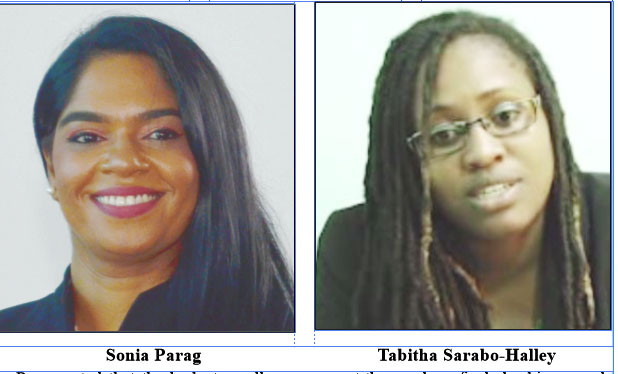Minister of Public Service Sonia Parag and her predecessor Tabitha Sarabo-Halley yesterday squared off over whether there had been discrimination in the ministry’s public scholarship programme with the former contending that hinterland regions were particularly badly served.
In her contribution to the debate on the 2020 national budget which she described among other things, as being anti-public servant, Sarabo-Halley in addressing the issue of scholarships said that Parag seemed confused by the difference in meanings between demographic and geographic.
But Parag in her maiden speech to the House at the Arthur Chung Conference Centre fired back saying that the government side could not be responsible for the misunderstanding of any terms of the English language by the Opposition.
Parag held to her contention that the scholarship award programme was skewed to one demographic and geographic stating that there were statistics to substantiate this, stating that in particular, no scholarships were given to some Amerindian Regions by the former Administration for the last five years.
In her presentation, however, APNU+AFC Opposition Member of Parliament (MP) Sarabo-Halley after defining the terms demographic and geographic, said that contrary to Parag’s summation, she did not offer a demographic chart, but instead a geographic chart which clearly showed the number of persons who gained scholarships to attend the University of Guyana (UG) based on their region of origin.
The former minister said that the department of public service awarded scholarships for students to attend local institutions other than UG as well as international institutions.
Having made this outline, Sarabo-Halley said that Parag’s conclusion that the number shown represented the total number of scholarships was false.
She said that statements made in the press by Parag that scholarships were skewed to one demographic and geographic in Guyana “can only be seen for what it is,” which according to Sarabo-Hally was a view of the governing PPP/C that the Opposition APNU+AFC, “would do exactly what they did while they were previously in office.”
Sarabo-Halley advanced that if Parag had taken time to peruse the data, she would recognize that it was her statements and beliefs which were skewed, and not the management or distribution of scholarships over the last five years that the Opposition was in government.
Pattern
Parag, however, stating that there has been a pattern over the last five years, said that regarding overseas scholarships; there was one to Region 1, five to Regions 2 and 3, 36 to Region 4, two to Region 5, 12 to Region 6, none to Regions 7, 8 and 9; and five to Region 10.
Regarding the local awards, the minister said that there were three to Region 1, eight to Region 2, 25 to Region 3, 122 to Region 4, 11 to Region 5, 23 to Region 6, four to Region 7 and none to Region 8, four to Region 9 and 28 to Region 10.
Parag said that the Hinterland and the Indigenous people for whom the Opposition is “fighting so much for,” had been left behind for the past five years.
Parag noted that the budgetary allocation for her ministry is $181,951,000 of which $113, 484,000 will be allocated for training and scholarships.
She said that in 2019, just over 500 scholarship applications were made to the Ministry of Public Service under the former Administration but that under the new government, in just three weeks the ministry received more than 700 applications from across the country.
She said that for Region 8 alone there are 68 applications.
She said that it is by such means that the new government is able to reflect the diversity of Guyana in the public service.
Sarabo-Halley requested of the Speaker that it be placed on record that the scholarships awarded under the David Granger-led APNU+AFC Administration were consistent with the applications received.
On this point Sarabo-Halley said that if candidates from a particular ethnic group applied for scholarships more than candidates from other groups “then one would expect the number of scholarships awarded to be consistent with this fact.”
According to Sarabo-Halley, contrary to what Parag’s public comments suggest, “all names of English origin do not necessarily reflect a particular ethnic group; especially since over the past five years, the Ministry of Indigenous People’s Affairs was allocated a significant percentage of scholarships by the Department of Public Service annually.”
According to Sarabo-Halley, under the APNU+AFC Administration, the scholarship selection committee was reconstituted to represent the multi-ethnic nature of the Guyanese society to allow for a more transparent process in the award of scholarships.
The MP said she hoped that Parag’s observation of their being limited human resource skills across the public service would allow her to recognize the need for the Bertram Collins College of the Public Service.






